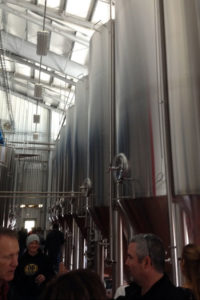
Editor’s Note: This sponsored column is written by Nick Anderson, beermonger at Arrowine (4508 Lee Highway).
So far, 2014 has been a year of great tumult: breweries are opening and closing at record numbers; craft beer is continuing to increase its share of the total market even as the ever-present debate over what “craft” is — or if such a term should even exist — goes on. The rapid growth of craft beer has brought once inconsequential regulatory/trademark issues into the spotlight — 2014 could very well go down in the books as the year of the “cease and desist” letter.
Amid all of this madness, something has been happening that I’ve noticed, but haven’t delved into here yet; a “changing of the guard” at some of the most beloved craft breweries out there, as recipes are retired to make way for new ones in the increasingly competitive beer market.
A couple of beer business stories brought this to my mind this week: the first being the news that Fort Collins Brewery was retiring their 1900 Amber Lager. This isn’t a beer that’s been any mainstay for me (I’ve never carried Fort Collins beers), but it had only been in production since 2009. Fort Collins General Manager Tina Peters said in the brewery’s press release that “as a craft brewery that strives to always better ourselves, we felt as a company it was more important to shift focus away from 1900 and to the present and the future direction of FCB.”
Smuttynose also announced this week that it will be putting its Star Island Single Belgian-style Pale Ale out to pasture; the decision was made as the New Hampshire brewery readies two new six-packs beers for release; Vunderbar Pilsner, set to go on sale in June, and Bouncy House, a 4.3 percent Session IPA that will debut here in D.C. at next month’s SAVOR event.
Adding yet another “Session IPA” to the market might smack some of trend-chasing, but in today’s climate every way a brewery can find to wedge their product onto a retailer’s shelf or a bar’s tap list is worth exploring. Also, with many of the “big name” craft breweries celebrating their 20th, 25th, or 30th anniversaries, there’s something to be said for familiarity breeding contempt.
This leads to happenings like Bell’s Brewing changing the name, label, and recipe of their well-regarded Pale Ale. The “new” Midwestern Pale Ale has only the minor change of some barley malt coming from the Bell’s Farm in Michigan, but result feels like a dramatic shift: the old Bell’s Pale Ale wasn’t a bitterly hoppy beer by any stretch, but had a focus to its hop that reminded me of the minerality present in the great white wines of France’s Loire Valley. Midwestern Pale Ale feels dialed back by comparison, with a smoother mouthfeel and greater barley presence throughout. In any event, Midwestern Pale Ale is very good and proved a success — I sold more of it in the first couple of months after its release than I had the old Pale Ale over the last few months of its availability.
“New” is often the order of the day now in beer. Once upon a time Victory made one Imperial IPA — Hop Wallop, an 8.5 percent ABV hop monster. Now Hop Wallop is “relegated” to draft-only production, while the new (and delicious) Dirt Wolf Imperial IPA takes a year-round place in Victory’s lineup, with another Imperial IPA (Hop Ranch) as a winter seasonal. It’s a difficult line to walk; making new fans in new markets with the beers that made you famous while simultaneously offering new things to your longtime fanbase to keep them from regarding you as “been there, done that.” I don’t envy breweries who are dancing this dance; I just look forward to trying new things and hope some of my old favorites don’t get left by the wayside. (more…)



